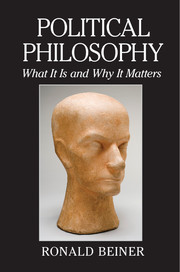Book contents
- Frontmatter
- Dedication
- Contents
- First Prologue: Horizons of Political Reflection
- Second Prologue: Freud, Weber, and Political Philosophy
- 1 Hannah Arendt: The Performativity of Politics
- 2 Michael Oakeshott: Life’s Adventure
- 3 Leo Strauss: The Politics of Philosophy
- 4 Karl Löwith: In Awe of the Cosmos
- 5 Excursus on Nature and History in the Strauss-Löwith Correspondence
- 6 Eric Voegelin: Modernity’s Vortex
- 7 Simone Weil: The Politics of the Soul
- 8 Hans-Georg Gadamer: Philosophy without Hubris
- 9 Jürgen Habermas: Politics as Rational Discourse
- 10 Michel Foucault’s Carceral Society
- 11 Alasdair MacIntyre: Fragmentation and Wholeness
- 12 Short Excursus on the Rise and Decline of Communitarianism as a Political Philosophy
- 13 John Rawls and the Death of Political Philosophy
- 14 Richard Rorty: Knocking Philosophy off Its Pedestal, or the Death of Political Philosophy Postmodernized
- Epilogue: On Not Throwing in the Towel
- Index
- References
8 - Hans-Georg Gadamer: Philosophy without Hubris
Published online by Cambridge University Press: 05 August 2014
- Frontmatter
- Dedication
- Contents
- First Prologue: Horizons of Political Reflection
- Second Prologue: Freud, Weber, and Political Philosophy
- 1 Hannah Arendt: The Performativity of Politics
- 2 Michael Oakeshott: Life’s Adventure
- 3 Leo Strauss: The Politics of Philosophy
- 4 Karl Löwith: In Awe of the Cosmos
- 5 Excursus on Nature and History in the Strauss-Löwith Correspondence
- 6 Eric Voegelin: Modernity’s Vortex
- 7 Simone Weil: The Politics of the Soul
- 8 Hans-Georg Gadamer: Philosophy without Hubris
- 9 Jürgen Habermas: Politics as Rational Discourse
- 10 Michel Foucault’s Carceral Society
- 11 Alasdair MacIntyre: Fragmentation and Wholeness
- 12 Short Excursus on the Rise and Decline of Communitarianism as a Political Philosophy
- 13 John Rawls and the Death of Political Philosophy
- 14 Richard Rorty: Knocking Philosophy off Its Pedestal, or the Death of Political Philosophy Postmodernized
- Epilogue: On Not Throwing in the Towel
- Index
- References
Summary
Hans-Georg Gadamer is a thinker who was schooled in uncompromising Heideggerian radicalism, but who wants to counterbalance that radicalism with a firm commitment to intellectual humility and moderation as well as a conservative appreciation of tradition. Heidegger embodied the kind of philosophical hubris that it takes to believe one has penetrated into the deepest mysteries of being, and plumbed the most abysmal errors of the dominant civilization. Gadamer’s counter to Heidegger’s hubris is an appeal to human finitude, and to an awareness of limits (including the limits of philosophy). The truth is: we need the kind of heroic hubris displayed by a Heidegger in order to maintain the vibrancy of the philosophical tradition. Philosophers in the epic mold need to believe that they have seized insights that have eluded all their predecessors; they need to believe that they have analyzed the problems of human existence at a deeper level than has yet been achieved. But against this, Gadamer insists on the wisdom that as human beings, we need humility as much as, and probably more than, we need hubris.
Radical assertions about civilizational crisis, and a deep tear in our relations to the past, are certainly not lacking in some of the thinkers canvassed in earlier chapters. Hannah Arendt, for instance, never ceased to insist that “the thread of tradition is broken, and ... we shall not be able to renew it.” In Strauss, too, there is an emphatic thesis about our time being characterized by a severe “crisis of modernity,” made worse by the fact that the sharp rupture between moderns and ancients cuts us off from the classical wisdom we would need in order to deal adequately with this crisis. And the analysis of crisis and rupture that we get in Voegelin is probably even more dire. No doubt, the crisis-sensibility exhibited by some of these thinkers, and the tone in which they express their analyses, owes something to the intellectual legacy of Heidegger.
- Type
- Chapter
- Information
- Political PhilosophyWhat It Is and Why It Matters, pp. 122 - 134Publisher: Cambridge University PressPrint publication year: 2014
References
- 1
- Cited by

